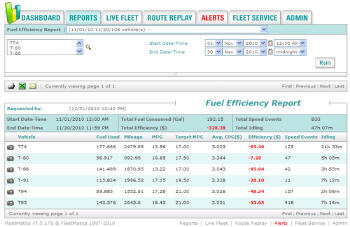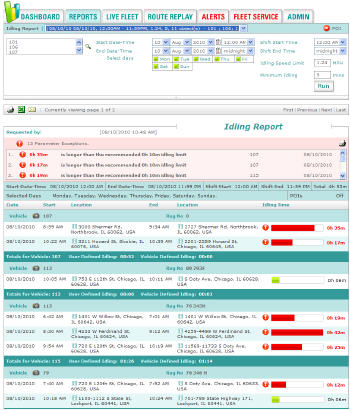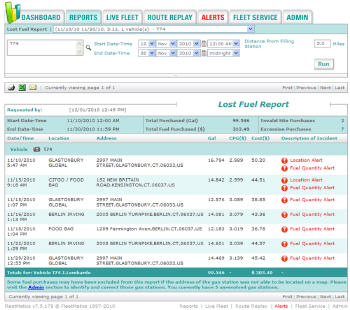Global positioning system (GPS) vehicle tracking has rapidly gained popularity among fleet owners as the technology becomes more affordable and easier to access. In general, GPS vehicle tracking utilizes a space-based global navigation satellite system to track time and location information for fleet vehicles. This information is then transmitted to a remote user who can monitor vehicle location, speed, routing, idle time, engine start-up and shut-down, and much more.
This information can be used to improve a host of fleet management operations including the reduction of fuel costs. According to a study by the Aberdeen Group, a market research firm, fleets with GPS tracking installed experience a 13 percent reduction in fuel costs on average.
Here are five proven ways fleet owners can use GPS vehicle tracking to help reduce fuel costs.
1. Reducing Vehicle Speed
According to the U.S. Environmental Protections Agency (EPA), each five mph driven above the posted speed limit has the net effect of costing about 20 cents more per gallon of gas. Multiply that cost across several vehicles and you have a huge source of cost leakage.
Most GPS vehicle tracking solutions provide accurate speed information about each vehicle tracked. But the best GPS solutions also include alerting features that will notify you immediately when a vehicle exceeds a set speed threshold.
Brenner Oil Company of Holland, Michigan has a fleet of 85 vehicles that delivers oil to residential and commercial customers throughout western Michigan. The company installed GPS vehicle tracking as a way to reduce fuel costs and discovered that the system helped it keep its vehicles at fuel-efficient speeds.
“The speed monitoring feature of GPS has really helped to slow the drivers down and consequently has contributed to our reduced fuel costs,” said Lisa Slade, logistics coordinator at Brenner Oil. “Drivers know I watch their speed, and I even get some calling me up to ask how fast the system says they are going.”
2. Decreasing Idle Times
According to Ford Motor Company, every hour of idle time is equal to approximately 25 miles of driving. Contrary to popular belief, the EPA states that restarting an engine uses no more fuel than 30 seconds of idling and has very little harmful impact on vehicle components. When drivers use their vehicles as climate control, it costs businesses money.
Quality GPS tracking systems notify you when a vehicle idles for excessive periods of time, wasting fuel and being nonproductive. Prior to implementing a GPS tracking system, Brenner Oil had no way of knowing whether or not vehicles were idling. With GPS installed, Slade can run a report in a few seconds that provides a detailed account of idling time for each vehicle.
“The Idling Report is the one report I use the most in our GPS system. I’m looking for anyone idling more than two hours per day,” said Slade. “If anyone is violating that, the matter is brought up in the daily meeting.” As a result of paying close attention to the Idling Report, the company has reduced idling times by 45 minutes per vehicle per day.
3. Improved Routing and Dispatching
Since GPS tracking provides the precise location of every vehicle, dispatchers can more effectively manage routing and dispatching. Dispatchers can ensure vehicles take the most direct route to any job site and can get lost drivers back on track. The best GPS fleet tracking solutions also provide current traffic conditions so you can divert drivers around delays.
Some GPS solutions have the ability to locate the vehicles that are closest to any job site. With this information, managers can ensure jobs are assigned in the most efficient manner possible. In addition, fleet managers will know if drivers use vehicles for unauthorized journeys or purposely take extended routes to job sites. Once Brenner Oil implemented its GPS solution, Slade was shocked to discover that many drivers took scenic routes instead of the highway. This added up to 20 minutes or more per day per driver wasted on improper routing. With proper routing management and effective dispatching, vehicles do not spend as much time traveling between jobs. Shorter travel time means less fuel spent on the road.
4. Proper Vehicle Maintenance
Vehicles that receive regular maintenance run more efficiently and use less fuel than neglected vehicles. A quality GPS fleet tracking system can also ensure that vehicles receive proper maintenance. Alerts can be set for each vehicle based on calendar time, engine on-time, or mileage depending on the type of service needed. When a vehicle is due for maintenance, notification is sent via email or in the reporting suite.
A proactive vehicle maintenance program can also reduce the chance of vehicles malfunctioning on the roadways and causing serious accidents. In addition, properly maintained vehicles help save assets by keeping vehicles on the road to do more business, costing less money in repairs over time.
5. Fuel Card Integration
Many fleet managers use fuel cards to help control and manage fuel costs. Integrating fuel card usage with a GPS fleet tracking system will give complete visibility of how the fuel is spent. Reports generated by fuel card companies are notoriously long and complicated. A GPS tracking system that allows the integration of fuel card usage will present the information in an easy format.
Users get precise fueling information for the overall fleet, as well as individual fuel usage of a specific vehicle,making it easy to pinpoint any fuel wasting practices, or outright fuel theft. Reliable card transaction information allows fleet managers to track accurate MPG, pinpoint the direct cause of high fuel consumption, eliminate fuel slippage, enforce fuel-saving driving habits, ensure vehicles run efficiently and ultimately reduce overall fuel costs.


